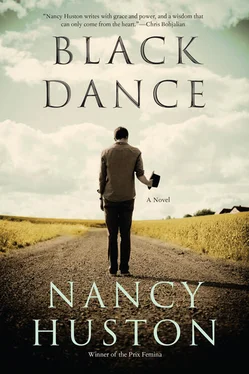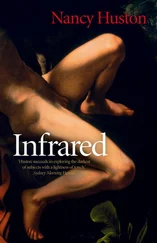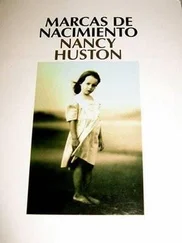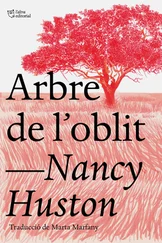“Y-you did?” gasps Neil, swallowing. “The-then what did you do?”
“We drop him at de hospital.”
Milo and Edith shove the broken boy out of the car onto the sidewalk, near a sign that reads HôPITAL SAINTE-MARIE.
“Well. . that’s fine, then,” says Neil, clearing his throat. “Long as you dropped him off someplace he could be taken care of. . You’re right, traitors deserve to be punished, as Polonius tells his son Laertes when he goes off to university. You remember that soliloquy from Hamlet , don’t you? Be thou familiar, but by no means vulgar.”
Milo takes over.
Dose friends dou hast, and deir adoption tried,
Grapple dem to dy soul wit hoops o’ steel
But do not dull dy palm wit entertainment
Of each new-hatch’d, unfledged comrade. Beware
Of entrance to a quarrel, but being in,
Bear’t dat de opposed may beware of dee
“Impeccable!” Neil says, enchanted with his scion. “But my most important advice to you, Milo, comes still and always from Yeats.
How can they know
Truth flourishes where the student’s lamp has shone,
And there alone, that have no solitude?
“. . Never fear solitude, Milo. In this time of political turmoil, beware of Loud Speakers. Remain ever a student.”
CUT.
Ripping him out of his reverie, the guard suddenly comes and clangs on the bars with his billy club:
“Telegram.”
Milo’s eyes focus. “Yeah?”
“It’s not mail day but we decided ta do you a favor.”
“I don’t need your favors.”
“Okay, you can go to hell.”
“Give it to me.”
“Oh, so you want it now? Say please. .”
At lightning speed both Milo’s hands are through the bars and around the man’s throat.
“Hand it over or you’re dead.”
“Bloody savage,” says the man, handing him the telegram. .
(Yes, okay, Milo. The telegram can only be from Marie-Thérèse’s daughter, your cousin Marie-Gabrielle. Though she was closer to you in age, only four years older, she didn’t play as important a role in your life as your male cousins, so I figured we could save a few thousand dollars by leaving her out of the story. But you’re right — no one else in the family could have sent you this message, so we’ll have to go back and put Marie-Gabrielle in everywhere. .)
GRANDPA NEIL DIED IN HIS SLEEP ON WEDNESDAY. HIS FUNERAL TOOK PLACE YESTERDAY, IN THE SAME CHURCH WHERE HE MARRIED OUR GRANDMA FIFTY YEARS AGO. THE CHURCH WAS ALMOST EMPTY, NOBODY KNEW HIM ANYMORE. IT WAS SUCH A PITY NOT EVEN YOU WERE THERE, MILO. WHEN WILL YOU BE GETTING OUT THIS TIME? YOUR LOVING COUSIN, GABRIELLE
The prison gives Milo a day’s leave. We see him heading home through the forest at nightfall. His nose catches a scent. He tenses, then breaks into an animal run. Ta, ta-da DA, ta, ta-da DA. . Sound track: no panting, only his steps thudding softly on the forest floor, like the soft beating of a drum. In the distance he sees white smoke billowing above black trees. Not the house. Behind the house. He goes around. A towering bonfire. Ta, ta-da DA, ta, ta-da DA. . Jean-Joseph is tossing armloads of books and papers out the window of Neil’s study on the second floor. François-Joseph is deftly catching them and adding them to the high, hissing flames. Both are singing, laughing, roaring drunk.
Milo turns on his heel and vanishes.
In the morning, after walking past the smoldering, smoking, stinking mound of ashes that was once his grandfather’s library, he bursts into the kitchen where his aunt is making hotcakes. As usual, her first reaction is to yell at him.
“Where have you been, Milo? The boys saw you arrive last night. You sneak up on us like that, you don’t say a word to anyone and then you vanish. We looked for you everywhere!”
She catches sight of his face and her tone changes. There are now large amounts of air between her words.
“What. . what’s wrong with y. .”
Milo goes over to the drawer and takes out the sharpest knife.
“Milo. . you’re upset about the fire, is that it?”
He approaches, wielding the knife, expressionless.
“It was just books, Milo!”
He advances on her.
“It was just books! Milo! What was I supposed to do with them? And besides, they were all in English!”
He pushes her up against the wall. Raising the knife, he looks calmly into her eyes.
“Régis! Help!”
The knifepoint comes to a hovering halt a quarter inch from Marie-Thérèse’s chest. Then Milo turns and plants the knife with all his might in the exact center of the maple wood table. His mother wouldn’t want him to spend the rest of his time on earth cooped up in lawcourts and jail cells. She’d want him to be free.
“You’ll see me again when you’re dead,” he says.
The knife is still vibrating when he slams the door and walks off the Dubé property for the last time.
• • • • •
Neil, 1920
SEPTEMBER. SLANTED SUNLIGHT. Maple trees aflame. Breathtaking beauty of the Quebec countryside during its brief autumn. The camera pans across the Chabot property (familiar to us as the Dubé property from forty years later) to a woodshed, its door open a crack. Sliding through the crack along with the sunlight, we fall on a page of Neil’s notebook. Uneasily perched on a stack of old apple crates, the writer is trying to write. We’re reminded of a similar scene in his Dublin bedroom a few years ago. . but his inner voice is even more anguished now than it was then. As Neil works on his text about exile, the camera glides through the woodshed and enters a vaster, barnlike space, lit in chiaroscuro by flashes of sunlight coming through small windows. There, it explores an enigmatic concatenation of tables and woodstoves, vats and tubes, bottles and utensils — not the laboratory of a mad scientist, but the ordinary paraphernalia required for the manufacture of maple syrup.
The thing about exile, Neil begins in voice-over, is that it forces you back into childhood. Even the first time around, being a child was mostly unpleasant. As soon as you can think, you are painfully conscious of being smaller and weaker than the powerful, prestigious giants who surround you. They despise, dominate, manipulate and look down on you. You are impatient to grow up, break free of them, become your own man. Thus, it is confounding and humiliating, at nearly thirty years of age, to find yourself, as it were, back at square one again. If your exile includes a language change, your sense of stupidity and helplessness will be compounded. . no, compound rhymes with confound, let’s say aggravated. . no, exacerbated. . no, aggravated. . by your lack of proficiency in the new tongue. You get by all right in private conversation with your loved ones, for loved ones tend to be indulgent. . but when you are obliged to deal on a daily basis with a large group of people, well acquainted among themselves and accustomed to communicating through quirky colloquialisms, inside jokes, onomatopoeia, muttered prayers and blasphemies, you suffer not only as much as but more than a child — for, unlike the latter, you have no hope or even wish of attaining proficiency in the local idiom. . It is most exasperating. I love Marie-Jeanne, but. . No, cross that out. This isn’t my diary, it is a personal reflection on the universal theme of exile. . Brought up in the city, you find yourself in the country. Armed with a law degree from Ireland’s finest university, you are suddenly being instructed in the fine points of making maple syrup. Formerly on intimate terms with the greatest poets and novelists of the day, you now prefer the company of cows to that of what passes, locally, for humanity. . No, that’s too nasty. After all, there were peasants in Ireland, too; I simply didn’t frequent them. I fought for their rights, of course — indeed I risked my life doing so — but I did not have to eat, drink and sleep with them, put up with their pungent body odors and their primitive sense of humor. New paragraph.
Читать дальше












